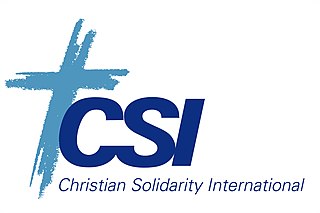
Genocide is the intentional destruction of a people in whole or in part. In 1948, the United Nations Genocide Convention defined genocide as any of five "acts committed with intent to destroy, in whole or in part, a national, ethnical, racial or religious group." These five acts were: killing members of the group, causing them serious bodily or mental harm, imposing living conditions intended to destroy the group, preventing births, and forcibly transferring children out of the group. Victims are targeted because of their real or perceived membership of a group, not randomly.
A holiday is a day or other period of time set aside for festivals or recreation. Public holidays are set by public authorities and vary by state or region. Religious holidays are set by religious organisations for their members and are often also observed as public holidays in religious majority countries. Some religious holidays, such as Christmas, have become or are becoming secularised by part or all of those who observe them. In addition to secularisation, many holidays have become commercialised due to the growth of industry.
A hate crime is a prejudice-motivated crime which occurs when a perpetrator targets a victim because of their membership of a certain social group or racial demographic.

Religious intolerance is intolerance of another's religious beliefs, practices, or lack thereof.
Christian terrorism, a form of religious terrorism, comprises terrorist acts which are committed by groups or individuals who profess Christian motivations or goals. Christian terrorists justify their violent tactics through their interpretation of the Bible and Christianity, in accordance with their own objectives and worldview.
A Holocaust memorial day or Holocaust remembrance day is an annual observance to commemorate the victims of the Holocaust, the genocide of six million Jews and of millions of other Holocaust victims by Nazi Germany and its collaborators. Many countries, primarily in Europe, have designated national dates of commemoration. In 2005, the United Nations instituted an international observance, International Holocaust Remembrance Day.

Religious violence covers phenomena in which religion is either the subject or the object of violent behavior. All the religions of the world contain narratives, symbols, and metaphors of violence and war. Religious violence is violence that is motivated by, or in reaction to, religious precepts, texts, or the doctrines of a target or an attacker. It includes violence against religious institutions, people, objects, or events. Religious violence does not exclusively include acts which are committed by religious groups, instead, it includes acts which are committed against religious groups.

Violence against women (VAW), also known as gender-based violence and sexual and gender-based violence (SGBV), are violent acts primarily or exclusively committed by men or boys against women or girls. Such violence is often considered a form of hate crime, committed against women or girls specifically because they are female, and can take many forms.

The International Holocaust Remembrance Day, or the International Day in Memory of the Victims of the Holocaust, is an international memorial day on 27 January that commemorates the victims of the Holocaust, which resulted in the genocide of one third of the Jewish people, along with countless members of other minorities by Nazi Germany between 1933 and 1945, an attempt to implement its "final solution" to the Jewish question. 27 January was chosen to commemorate the date when the Auschwitz concentration camp was liberated by the Red Army in 1945.
An honor killing, honour killing, or shame killing is the murder of an individual, either an outsider or a member of a family, by someone seeking to protect what they see as the dignity and honor of themselves or their family. Honor killings are often connected to religion, caste, other forms of hierarchical social stratification, or sexuality. Most often, it involves the murder of a woman or girl by male family members, due to the perpetrators' belief that the victim has brought dishonor or shame upon the family name, reputation or prestige. Honor killings are believed to have originated from tribal customs. They are prevalent in various parts of the world, especially in MENA countries, as well as in immigrant communities in countries which do not otherwise have societal norms that encourage honor killings. Honor killings are often associated with rural and tribal areas, but they occur in urban areas as well.

Christianity is the predominant religion in Tuvalu, with Calvinism being the single largest denomination. The Church of Tuvalu accounts for around 97% of the total population and is the state church of Tuvalu, although in practice this merely entitles it to "the privilege of performing special services on major national events". It is Calvinist in orientation and has a Congregationalist polity.

Domestic violence is violence or other abuse that occurs in a domestic setting, such as in a marriage or cohabitation. Domestic violence is often used as a synonym for intimate partner violence, which is committed by one of the people in an intimate relationship against the other person, and can take place in relationships or between former spouses or partners. In its broadest sense, domestic violence also involves violence against children, parents, or the elderly. It can assume multiple forms, including physical, verbal, emotional, economic, religious, reproductive, or sexual abuse. It can range from subtle, coercive forms to marital rape and other violent physical abuse, such as choking, beating, female genital mutilation, and acid throwing that may result in disfigurement or death, and includes the use of technology to harass, control, monitor, stalk or hack. Domestic murder includes stoning, bride burning, honor killing, and dowry death, which sometimes involves non-cohabitating family members. In 2015, the United Kingdom's Home Office widened the definition of domestic violence to include coercive control.
International Day of Innocent Children Victims of Aggression is a United Nations observance held on June 4 every year. It was established on 19 August 1982.
Defamation of religion is an issue that was repeatedly addressed by some member states of the United Nations (UN) from 1999 until 2010. Several non-binding resolutions were voted on and accepted by the UN condemning "defamation of religion". The motions, sponsored on behalf of the Organization of the Islamic Conference (OIC), now known as the Organisation of Islamic Cooperation, sought to prohibit expression that would "fuel discrimination, extremism and misperception leading to polarization and fragmentation with dangerous unintended and unforeseen consequences". Religious groups, human rights activists, free-speech activists, and several countries in the West condemned the resolutions arguing they amounted to an international blasphemy law. Critics of the resolutions, including human rights groups, argued that they were used to politically strengthen domestic anti-blasphemy and religious defamation laws, which are used to imprison journalists, students and other peaceful political dissidents.
The Declaration on the Elimination of Violence Against Women was adopted without a vote by the United Nations General Assembly in the 48/104 resolution of 20 December 1993. Contained within it is the recognition of "the urgent need for the universal application to women of the rights and principles with regard to equality, security, liberty, integrity and dignity of all human beings". It recalls and embodies the same rights and principles as those enshrined in such instruments as the Universal Declaration of Human Rights, and Articles 1 and 2 provide the most widely used definition of violence against women.

According to international observers, human rights in Belgium are generally respected and the law and the judiciary provides effective means of addressing individual instances of abuse. However, some concerns have been reported by international human rights officials over the treatment of asylum seekers, prison overcrowding and the banning of full face veils. Capital punishment in Belgium is fully abolished and a prohibition on the death penalty is included in the Constitution of Belgium. Belgium was a founding member of the European Union and the Council of Europe and a signatory to the European Convention on Human Rights. Belgium has minimal issues regarding corruption and was ranked 15 out of 167 countries surveyed in Transparency International's 2015 Corruption Perceptions Index.

Christian Solidarity International (CSI) is a Christian human rights NGO that is "committed to defending religious liberty, helping victims of religious repression, victimized children, and victims of disaster." It is based in Switzerland, with affiliates in the United States, Czech Republic, France, Germany, Hungary, and South Korea.
The right to sexuality incorporates the right to express one's sexuality and to be free from discrimination on the grounds of sexual orientation. Specifically, it relates to the human rights of people of diverse sexual orientations, including lesbian, gay, bisexual and transgender (LGBT) people, and the protection of those rights, although it is equally applicable to heterosexuality. The right to sexuality and freedom from discrimination on the grounds of sexual orientation is based on the universality of human rights and the inalienable nature of rights belonging to every person by virtue of being human.
Prosecution of gender-targeted crimes is the legal proceedings to prosecute crimes such as rape and domestic violence. The earliest documented prosecution of gender-based/targeted crimes is from 1474 when Sir Peter von Hagenbach was convicted for rapes committed by his troops. However, the trial was only successful in indicting Sir von Hagenbach with the charge of rape because the war in which the rapes occurred was "undeclared" and thus the rapes were considered illegal only because of this. Gender-targeted crimes continued to be prosecuted, but it was not until after World War II when an international criminal tribunal – the International Military Tribunal for the Far East – were officers charged for being responsible of the gender-targeted crimes and other crimes against humanity. Despite the various rape charges, the Charter of the Tokyo Tribunal did not make references to rape, and rape was considered as subordinate to other war crimes. This is also the situation for other tribunals that followed, but with the establishments of the International Criminal Tribunal for the former Yugoslavia (ICTY) and the International Criminal Tribunal for Rwanda (ICTR), there was more attention to the prosecution of gender-targeted crimes with each of the statutes explicitly referring to rape and other forms of gender-targeted violence.
The Republic of Palau has had a turbulent history over the last 450 years, with many states claiming ownership over them. Since World War II, the Islands came under United Nations' trusteeship and were administered by the United States. After becoming a sovereign state in 1994, Palau joined the UN and ratified the Convention on the Rights of the Child in 1995, the Convention on the Rights of Persons with Disabilities and the optional protocol to the latter in 2013. In 2011, the International Covenant on Civil and Political Rights in 2011 and other core human rights treaties were signed. These treaties are yet to be ratified.








